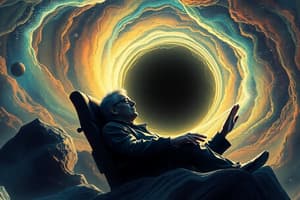Podcast
Questions and Answers
What significant prediction did Stephen Hawking make regarding black holes in 1974?
What significant prediction did Stephen Hawking make regarding black holes in 1974?
- Black holes emit heat and can evaporate. (correct)
- Black holes absorb all information.
- Black holes can exist without singularities.
- Black holes are destroyed by gravitational waves.
What was the primary focus of Hawking's PhD thesis?
What was the primary focus of Hawking's PhD thesis?
- The theory of relativity
- Quantum mechanics and gravity
- The behavior of black holes
- Properties of expanding universes (correct)
Which event marked Stephen Hawking's appointment to a noteworthy academic position in 1979?
Which event marked Stephen Hawking's appointment to a noteworthy academic position in 1979?
- Received the Nobel Prize in Physics
- Director of NASA's Astrophysics Division
- Cambridge's Lucasian Professor of Mathematics (correct)
- Founding member of the Royal Society
Who preceded Stephen Hawking in studying the concept of black holes?
Who preceded Stephen Hawking in studying the concept of black holes?
What technology did Stephen Hawking utilize to communicate after losing his voice?
What technology did Stephen Hawking utilize to communicate after losing his voice?
What phenomenon did matter dragged into a black hole create?
What phenomenon did matter dragged into a black hole create?
What was a key aspect of Hawking's collaboration with Roger Penrose?
What was a key aspect of Hawking's collaboration with Roger Penrose?
What impact did Stephen Hawking's book, A Brief History of Time, have on the public's understanding of science?
What impact did Stephen Hawking's book, A Brief History of Time, have on the public's understanding of science?
What is the significance of the particle-antiparticle pairs created near the event horizon of a black hole?
What is the significance of the particle-antiparticle pairs created near the event horizon of a black hole?
Which theory did Roger Penrose develop that relates to the geometry of spacetime around black holes?
Which theory did Roger Penrose develop that relates to the geometry of spacetime around black holes?
What effect does Hawking radiation have on a black hole over time?
What effect does Hawking radiation have on a black hole over time?
Which of the following is a notable accolade received by Stephen Hawking?
Which of the following is a notable accolade received by Stephen Hawking?
What major scientific topic did both Roger Penrose and Stephen Hawking significantly contribute to?
What major scientific topic did both Roger Penrose and Stephen Hawking significantly contribute to?
Flashcards
What is a black hole?
What is a black hole?
A region of spacetime where gravity is so strong that nothing, not even light, can escape.
What did Hawking's PhD thesis suggest?
What did Hawking's PhD thesis suggest?
Stephen Hawking's groundbreaking PhD thesis proposed that the universe originated from a singularity, a point of infinite density and zero volume.
Hawking and Penrose's key discovery regarding Black Holes.
Hawking and Penrose's key discovery regarding Black Holes.
Hawking's collaboration with Roger Penrose proved the existence of gravitational singularities, which occur when large stars collapse under their own gravity.
Hawking's key discovery about black hole radiation.
Hawking's key discovery about black hole radiation.
Signup and view all the flashcards
Stephen Hawking's famous book
Stephen Hawking's famous book
Signup and view all the flashcards
What is ALS?
What is ALS?
Signup and view all the flashcards
What is a speech synthesizer?
What is a speech synthesizer?
Signup and view all the flashcards
Who first coined the name 'black hole'?
Who first coined the name 'black hole'?
Signup and view all the flashcards
What is Hawking Radiation?
What is Hawking Radiation?
Signup and view all the flashcards
Who is Roger Penrose?
Who is Roger Penrose?
Signup and view all the flashcards
What is a Black Hole singularity?
What is a Black Hole singularity?
Signup and view all the flashcards
What is "A Brief History of Time"?
What is "A Brief History of Time"?
Signup and view all the flashcards
What did Stephen Hawking achieve despite his physical challenges?
What did Stephen Hawking achieve despite his physical challenges?
Signup and view all the flashcards
Study Notes
Stephen Hawking: A Summary
- Stephen Hawking, a renowned theoretical physicist, used mathematics to explore black holes and the origins of the universe.
- He popularized complex scientific ideas to a broader audience, enabling millions to understand space-time, gravity, and humanity's place in the cosmos.
- Hawking was born in 1942 and died in 2018.
- He was diagnosed with ALS in 1963, which led to significant physical limitations, beginning in 1969.
- Hawking communicated using a speech synthesizer controlled by facial muscles.
Hawking's Contributions
- The term "black hole" emerged in 1967, although its concept originated earlier.
- Hawking was fascinated by black holes, especially how they might reveal the universe's origins, working to explore the possibility of the universe's processes reversing.
- He investigated, through his PhD thesis, the possibility of the universe's processes reversing, exploring the concept of "singularity," an infinitely dense and small point in space-time at the collapse of a star. His research further developed Einstein's general theory of relativity.
- His work on black holes was complemented by collaboration with Roger Penrose, a mathematician.
- Using quantum theory, Hawking predicted in 1974 that black holes emit heat and evaporate.
- His work contributed to understanding space-time, gravity, and humanity's place in the cosmos.
Milestones
- In 1966, Hawking's PhD thesis, exploring expanding universes, outlined the genesis of the universe from a singularity.
- He received the Lucasian Chair of Mathematics at Cambridge beginning in 1979.
- Hawking's renowned book, "A Brief History of Time," was published in 1988 and became a significant cultural phenomenon. It remained on the Sunday Times bestseller list for 237 weeks.
- Hawking was appointed Lucasian Professor of Mathematics at Cambridge University in 1979, a position he held until 2009.
- He undertook research on black holes and received other accolades for his work.
- He also wrote several popular science books, including A Brief History of Time.
- He traveled widely, giving public lectures to captivated audiences.
- He won the Breakthrough Prize in Fundamental Physics in 2018 (worth $3 million).
Studying That Suits You
Use AI to generate personalized quizzes and flashcards to suit your learning preferences.





